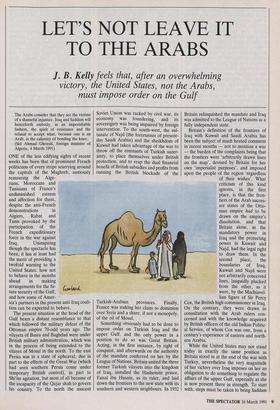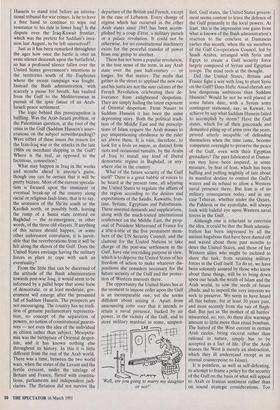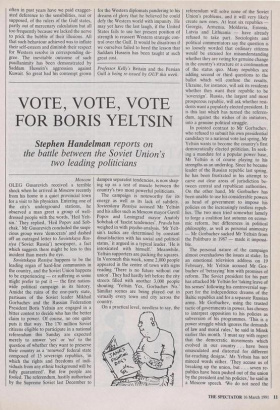LET'S NOT LEAVE IT TO THE ARABS
J. B. Kelly feels that, after an overwhelming
victory, the United States, not the Arabs, must impose order on the Gulf
The Arabs consider that they are the victims of a shameful injustice. Iraq and Saddam will henceforth embody, in an imperishable fashion, the spirit of resistance and the refusal to accept what, because one is an Arab, is the calamity of bending the knee. (Sid Ahmad Ghozali, foreign minister of Algeria, 4 March 1991)
ONE of the less edifying sights of recent weeks has been that of prominent French politicians of every stripe scurrying around the capitals of the Maghreb, anxiously reassuring the Alge- rians, Moroccans and Tunisians of France's
undiminished esteem and affection for them, despite the anti-French demonstrations in Algiers, Rabat and Tunis provoked by the participation of the French expeditionary force in the war against Iraq. Uninspiring though the spectacle has been, it has at least had the merit of providing a twofold warning to the United States: how not to behave in the months ahead in making arrangements for the fu- ture security of the Gulf, and how some of Amer- ica's partners in the present anti-Iraq coali- tion can be expected to behave.
The present situation at the head of the Gulf bears a distant resemblance to that which followed the military defeat of the Ottoman empire 70-odd years ago. The vilayets of Basra and Baghdad were under British military administration, which was in the process of being extended to the vilayet of Mosul in the north. To the east Persia was in a state of upheaval, due in part to the effects of the Great War (which had seen southern Persia come under temporary British control), in part to Shi'ite agitation, but most of all because of the incapacity of the Qajar shah to govern his country. To the north the nascent Soviet Union was racked by civil war, its economy was foundering, and its sovereignty was being impaired by foreign intervention. To the south-west, the sul- tanate of Najd (the forerunner of present- day Saudi Arabia) and the sheikhdom of Kuwait had taken advantage of the war to throw off the remnants of Turkish suzer- ainty, to place themselves under British protection, and to reap the dual financial benefit of British subsidies and profits from running the British blockade of the Turkish-Arabian provinces. Finally, France was staking her claim to dominion over Syria and a share, if not a monopoly, of the oil of Mosul.
Something obviously had to be done to impose order on Turkish Iraq and the upper Gulf, and the only power in a position to do so was Great Britain. Acting, in the first instance, by right of conquest, and afterwards on the authority of the mandate conferred on her by the League of Nations, Britain united the three former Turkish vilayets into the kingdom of Iraq, installed the Hashemite prince, Faisal ibn Husain, as its ruler, and laid down the frontiers to the new state with its southern and western neighbours. In 1932 Britain relinquished the mandate and Iraq was admitted to the League of Nations as a fully independent state.
While the United States may not stand today in exactly the same position as Britain stood in at the end of the war with Turkey, nevertheless the very magnitude of her victory over Iraq imposes on her an obligation to do something to regulate the affairs of the upper Gulf, especially as she is now present there in strength. To start with, steps must be taken to bring Saddam Hussein to stand trial before an interna- tional tribunal for war crimes. Is he to have a free hand to continue to wipe out resistance to his rule in lower Iraq? Is the dispute over the Iraq-Kuwait frontier, which was the pretext for Saddam's inva- sion last August, to be left unresolved?
Just as it has been remarked throughout the ages how once the battle is over an eerie silence descends upon the battlefield, so has a profound silence fallen over the United States government's intentions in the territories south of the Euphrates where the recent campaign was fought.
Instead the Bush administration, with scarcely a pause for breath, has vaulted from the Gulf to the Mediterranean in pursuit of the ignis fatuus of an Arab- Israeli peace settlement.
The logic behind this preoccupation is baffling. Was the Arab-Israeli problem, or the Palestinian question, at the root of the crisis in the Gulf (Saddam Hussein's assev- erations on the subject notwithstanding)?
Were either of these issues the reason for the Iran-Iraq war or the attacks in the late 1980s on merchant shipping in the Gulf? Where is the real, as opposed to the factitious, connection?
What may happen in Iraq in the weeks and months ahead is anyone's guess, though one can be certain that it will be pretty bizzare. Most of the current specula- tion is focused upon the imminent or eventual break-up of the country along racial or religious fault-lines; that is to say, the secession of the Shi'ite south or the Kurdish north, or possibly both, leaving the rump of a Sunni state centred on Baghdad — the re-emergence, in other words, of the three old vilayets. If anything of this nature should happen, or some other unforeseen convulsion, it is inevit- able that the reverberations from it will be felt along the shores of the Gulf. Does the United States envisage having the military forces in place to cope with such an eventuality?
From the little that can be discerned of the attitude of the Bush administration towards post-war Iraq, it would seem to be informed by a pallid hope that some form of democratic, or at least moderate, gov- ernment will emerge after the presumed fall of Saddam Hussein. The prospects are not encouraging. The country has no tradi- tion of genuine parliamentary representa- tion, no concept of the separation of powers, no notion of constitutional guaran- tees — not even the idea of the individual as citizen rather than subject. Mesopota- mia was the birthplace of Oriental despot- ism, and it has known nothing else throughout its history. In this it is little different from the rest of the Arab world.
There was a time, between the two world wars, when the states of the Levant and the fertile crescent, under the tutelage of Britain and France, flirted with constitu- tions, parliaments and independent judi- ciaries. The flirtation did not survive the departure of the British and French, except in the case of Lebanon. Every change of regime which has occurred in the other Arab states since 1945 has been accom- plished by a coup d'etat, a military putsch or a palace revolution. It could not be otherwise, for no constitutional machinery exists for the peaceful transfer of power from one group to another.
There has not been a popular revolution, in the true sense of the term, in any Arab state over the past half-century — or longer, for that matter. The mobs that gather in the street to applaud the new rats and his junta are not the sans culottes of the French Revolution celebrating their de- liverance from enlightened despotism. They are simply hailing the latest exponent of Oriental despotism. From Nasser to Saddam Hussein it has been the same depressing story. Both the political tradi- tion of the Middle East and the prescrip- tions of Islam require the Arab masses to pay unquestioning obedience to the ruler set above them. It is vain, therefore, to look for a levee en masse, as distinct from riots and occasional tumults, by the Arabs of Iraq to install any kind of liberal democratic regime in Baghdad, or any- where else in the country.
What of the future security of the Gulf itself? There is a great babble of voices to be heard at the present time, all adjuring the United States to regulate the affairs of the region according to the desires and expectations of the Saudis, Kuwaitis, Iran- ians, Syrians, Egyptians and Palestinians. These assorted demands and supplications, along with the much-touted international conference on the Middle East, the prop- osal of President Mitterrand of France for a tete-a-tete of the five permanent mem- bers of the UN Security Council, and the clamour for the United Nations to take charge of the post-war settlement in the Gulf, have one overriding purpose in view, which is to deprive the United States of her freedom of action to make whatever dis- positions she considers necessary for the future security of the Gulf and the protec- tion of Western interests there.
The opportunity the United States has at the moment to impose order upon the Gulf is an incomparable one, yet she seems diffident about seizing it. Apart from announcing sotto voce that it intends to retain a naval presence, backed by air power, in the vicinity of the Gulf, and to store military materiel in some, unspeci- 'Well, are are you going to marry my daughter or not?' fied, Gulf states, the United States govern- ment seems content to leave the defence of the Gulf primarily to the local powers. At least, this is the impression one gains from what is known of the Bush administration's reaction to the conclave at Damascus earlier this month, when the six members of the Gulf Co-operation Council, led by Saudi Arabia, arranged with Syria and Egypt to create a Gulf security force largely composed of Syrian and Egyptian troops. The mind reels at the thought.
Did the United States, Britain and France fight a vial. with Iraq to plant Syria on the Gulf? Does Hafiz Assad cherish any less dangerous ambitions than Saddam Hussein? Would he not be well placed at some future date, with a Syrian army contingent stationed, say, in Kuwait, to achieve by sap what Saddam Hussein failed to accomplish by storm? Have the Gulf states, which for all their gasconade and demented piling up of arms over the years, proved utterly incapable of defending themselves when the time came, become competent overnight to preserve the peace of the Gulf, even with their Egyptian grenadiers? The pact fabricated at Damas- cus may have been inspired, in some measure, by fear of Iran, which has been huffing and puffing mightily of late about its manifest destiny to control the Gulfs waters and its refusal to allow a Western naval presence there. But Iran is of no military consequence today, and in any case Teheran, whether under the Qajars, the Pahlavis or the ayatollahs, will always look with baleful eye upon Western naval forces in the Gulf.
Although one is reluctant to entertain the idea, it could be that the Bush adminis- tration has been impressed by all the ancient bugaboos that have been dusted off and waved about these past months to deter the United States, and those of her Western allies who might be inclined to share the task, from retaining military forces in the Gulf itself. To do so, we have been solemnly assured by those who know about these things, will be to bring down upon our heads the wrath of Islam and the Arab world, to sow the seeds of future jihads, and to imperil the very interests we seek to preserve. We seem to have heard all this before, for at least 30 years past, and most recently from the rais of Bagh- dad. But just as 'the mother of all battles' miscarried, so, too, do these dire warnings amount to little more than ritual bombast. The hatred of the West current in certain Arab circles, being visceral rather than rational in nature, simply has to be accepted as a fact of life. (For the Arab masses the West is merely an abstraction, which they ill understand except as an eternal counterpoise to Islam).
It is pointless, as well as self-defeating, to attempt to frame a policy for the security of the Gulf on the basis of what will appeal to Arab or Iranian sentiment rather than on sound strategic considerations. Too often in past years have we paid exagger- ated deference to the sensibilities, real or supposed, of the rulers of the Gulf states, partly out of mercenary calculation but all too frequently because we lacked the nerve to prick the bubble of their illusions. All that such behaviour achieved was to inflate their self-esteem and diminish their respect for Western resolve in corresponding de- gree. The inevitable outcome of such pusillanimity has been demonstrated by Saddam Hussein's aggression against Kuwait. So great had his contempt grown for the Western diplomats pandering to his dreams of glory that he believed he could defy the Western world with impunity. He may yet have the last laugh, if the United States fails to use her present position of strength to reassert Western strategic con- trol over the Gulf. It would be disastrous if we ourselves failed to heed the lesson that Saddam Hussein has been taught at such great cost.
Professor Kelly's Britain and the Persian Gulf is being re-issued by OUP this week.




























































 Previous page
Previous page